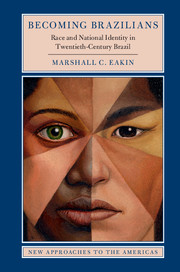'Becoming Brazilian is a comprehensive analysis of how racial mixture became heralded as a positive feature of Brazil over the course of the twentieth century. Drawing on a wide range of sources, this insightful study untangles the different components of this notion of national identity shared by most Brazilians, and criticized by others.'
James N. Green - Brown University, Rhode Island
'In Becoming Brazilians, Eakin offers a sweeping view of the ties between racial and national identity in the country with the largest population of African descent outside of Nigeria. Eakin helps us understand what it means to assert difference in a country whose intellectuals and politicians have so heavily invested in the production of a single national identity.'
Jerry Dávila - University of Illinois, Urbana-Champaign
'Becoming Brazilians uses a wide analytical lens to chart the intellectual and cultural waves that create the imagined community known as 'Brazil'. Using evidence from sports to radio to intellectual history, Marshall C. Eakin’s accessible style explains the often unique, and always diverse, national identities that have made modern Brazil and contemporary Brazilians.'
Jeffrey Lesser - Emory University, Atlanta, and author of Immigration, Ethnicity, and National Identity in Brazil, 1808 to the Present
'This is a wonderful volume that scholars have been long been waiting for, one that brings together a vast literature on Gilberto Freyre, Brazilian identity, and race, with new research and a far-reaching chronological scope. Eakin provides a fresh look into how modern mass media helped forge racialized visions of the nation that are still hotly debated.'
Anadelia A. Romo - Texas State University, and author of Brazil’s Living Museum: Race, Reform, and Tradition in Bahia
'Becoming Brazilians is an essential read for anyone who wants to understand race and culture in Brazil. Focusing on music, soccer, mass media, and politics and registering the efforts of Brazilians of all sorts, Eakin masterfully traces the emergence and disintegration of a national identity tied to the 'myth of racial democracy'. An instant, provocative classic.'
Roger Kittleson - Williams College, Massachusetts, and author of The Country of Football: Soccer and the Making of Modern Brazil
'Eakin has produced a wide-ranging and much-needed overview of the trajectory of Brazilian national identity over the twentieth century. In his use of a wide variety of sources, including film, literature, television, sport, music, a historical perspective on politics, Eakin gives us a much needed book for teaching about Brazil.'
Jan Hoffman French - author of Legalizing Identities: Becoming Black or Indian in Brazil’s Northeast
'Engaging a dazzling array of cultural expressions, Marshall C. Eakin traces the waxing and waning of mestiço nationalism in Brazil during the last century, showing how racial and cultural mixture have become deeply embedded in the national imaginary. Decades of social movement activism and scholarship has largely debunked the hoary notion that Brazil was a 'racial democracy', while the rise multicultural identity politics has posed a challenge the mestiço ideal. Yet Eakin also shows how and why mestiçagem has persisted as a social value and cultural practice in this age of difference and segmentation.'
Christopher J. Dunn - Tulane University, New Orleans
'The author’s sweeping analysis of the expansive secondary literature on race and nation in Brazil makes this book ideal for undergraduate Latin American or Brazilian history collections, or as a historiographical guide for early career graduate students. Essential.'
B. A. Lucero
Source: Choice
'… this book presents an interesting cultural history of nation-state making for modern Brazil, and therefore joins … the growing historical scholarships of race and nation in Latin America. It will be widely adopted as a textbook in undergraduate and graduate courses in Brazilian and modern Latin American history, and should serve as a helpful guide for advanced undergraduate and beginning graduate students for their research on the role of mass media in Brazil’s modern nation making.'
Mieko Nishida
Source: The American Historical Review



